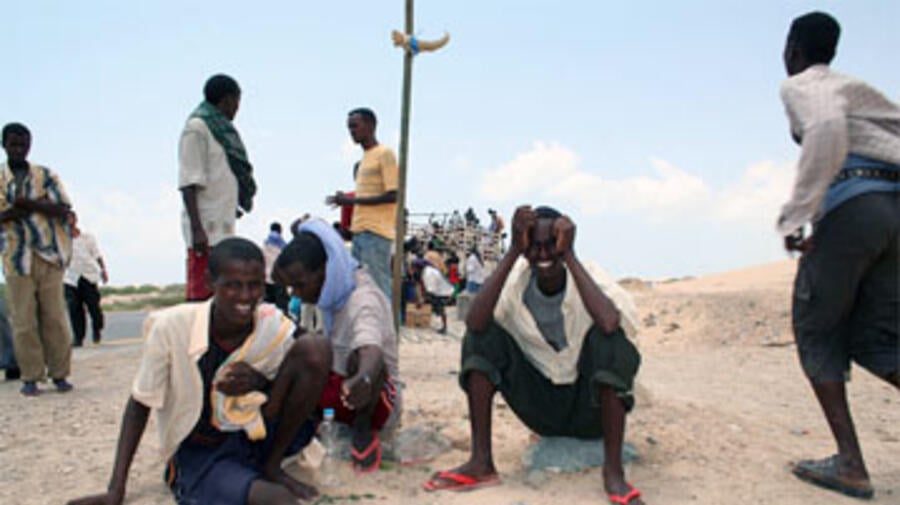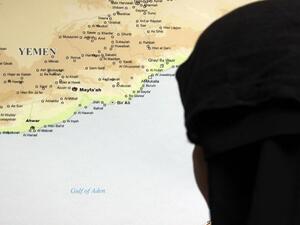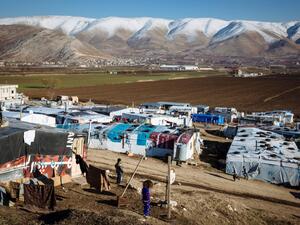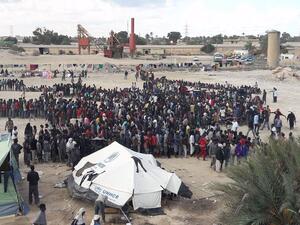Fifty-two Somalis die after being left adrift by smugglers for 18 days in Gulf of Aden
Fifty-two Somalis die after being left adrift by smugglers for 18 days in Gulf of Aden

Aid workers from a Yemeni NGO hand out food to Somalis and Ethiopians who had just been smuggled across the Gulf Aden, before transferring them to UNHCR's Mayfa'a reception centre.
SANA'A, Yemen, September 29 (UNHCR) - At least 52 Somalis perished after their stricken vessel was abandoned by smugglers in the Gulf of Aden, leaving them adrift for 18 days without food or water.
UNHCR's office in Yemen reported over the weekend that 71 people survived the ordeal after their inoperable boat drifted into Yemeni coastal waters on Sept. 21 and was rescued by local coast guards in Shihra.
Survivors said the boat left Marera on the Somali coast on Sept. 3 with at least 124 passengers aboard. Several hours into the voyage, the engine stopped and knife-wielding crewmen told passengers they would travel to the Somali city of Bossaso in a smaller boat to re-charge a battery. They never returned, leaving the passengers adrift for 18 days without food or water.
Forty-eight of the Somalis, 38 men and 10 women, died while the boat drifted the Gulf of Aden. Survivors said their bodies were thrown overboard.
After 18 days adrift, the boat finally approached Yemen's Shihra coast on Sept. 21, pushed by the current and high waves. Within sight of the coastline, three of the Somalis jumped into the sea to swim toward shore and alert authorities. One failed to make it to the beach and remains missing. A Yemen Coast Guard vessel towed the stricken boat to shore, where the passengers were met by UNHCR and its local humanitarian partners who provided food and water. Ten of the survivors were immediately hospitalized, but four later died.
The survivors, aged from 2 to 40 years old, were taken to UNHCR's Mayfa'a Reception Centre. They said they left Somalia because of continuing insecurity in the war-torn nation, drought and unemployment. Each passenger paid the smugglers between $70 and $100 for the voyage.
"This tragedy is the latest in a long series of deadly incidents involving people who are so desperate, so frightened and so discouraged that they are willing to risk everything, even their lives, to escape," said UNHCR spokesman Ron Redmond, in Geneva. "UNHCR and its humanitarian partners are trying to do everything they can to prevent further tragedies, but the real solution to this ongoing crisis has got to be political, not humanitarian."
There has been a recent upsurge in people smuggling across the Gulf of Aden from war-torn Somalia. So far this year, at least 31,192 people have arrived in Yemen after making the perilous voyage aboard smugglers' boats. They include 21,201 Somalis and 9,854 Ethiopians. More than 228 people have died and at least 262 remain missing.
Smuggling normally subsides between May and September because of stormy weather in the Gulf of Aden. With the early onset of calmer weather in August, smuggling resumed last month when 65 boats brought more than 2,500 desperate people to Yemen - nearly quadruple the number of arrivals for same month last year when 633 people landed in 10 boats. Through Sept. 23, at least 106 smuggling boats have brought 6,103 people to Yemen.
UNHCR believes a combination of factors is responsible for the recent increase in arrivals, including continuing strife and displacement in Somalia and the opening of new smuggling routes across the Gulf of Aden.
Humanitarian agencies have been jointly calling for global action to better address this deadly problem. Over the past year, UNHCR has substantially stepped up its work in Yemen. Its more than $17 million programme in Yemen - currently a little more than half funded - is providing additional staff, improved humanitarian assistance, additional shelter for refugees in Kharaz refugee camp, and training programmes for Yemeni coast guards and other officials. The agency has also increased its presence along the remote Yemeni coast with the opening of its second reception centre at Ahwar and reception facilities along the Red Sea. The other is at Mayfa'a.
In May, a regional conference was convened by UNHCR in cooperation with the Mixed Migration Task Force for Somalia to establish a regional mechanism and long-term plan of action on refugee protection and mixed migration in the Gulf of Aden. The mixed flow of people across the gulf includes a significant number of refugees. Additional funding will have to be made available in countries in the Horn of Africa, including Ethiopia, Djibouti and Somalia, to mitigate against such movements.
Yemen has carried a major burden in dealing with irregular migratory movements in the region, yet has maintained an open-door policy to refugees. Support from the international community, however, remains an absolute necessity.








